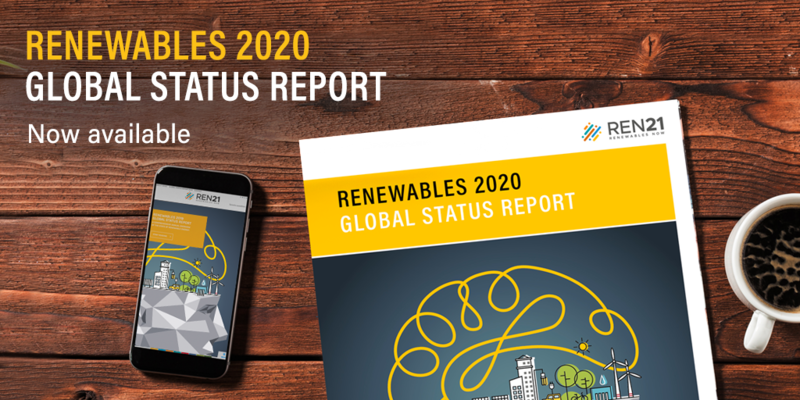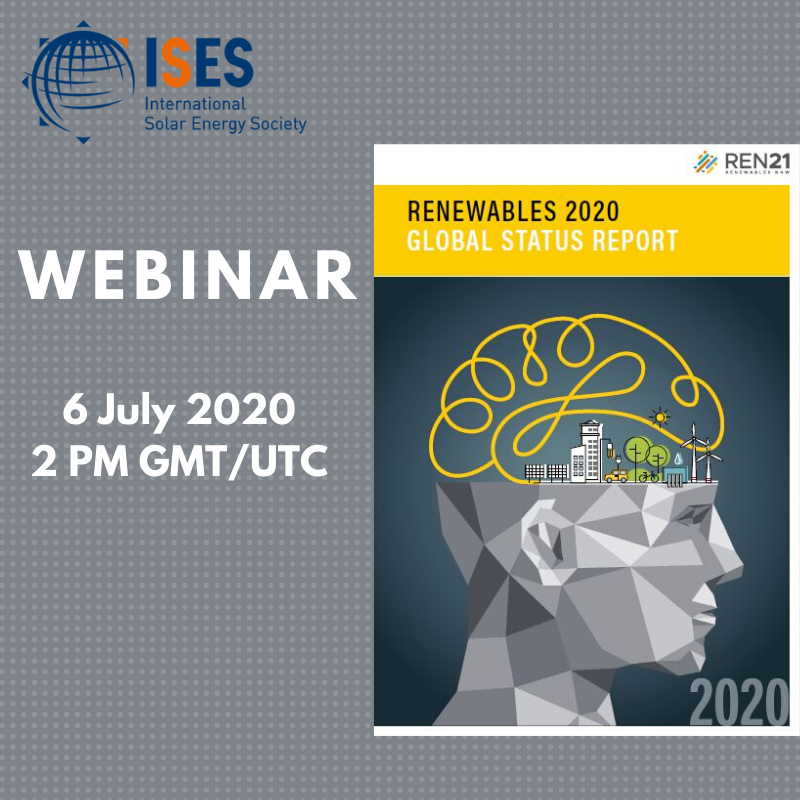REN21 GSR2020 released - join ISES on introductionary webinar!
On 16 June 2020, REN21 released the latest Renewables 2020 Global Status Report (GSR). Join ISES and REN21 for a webinar introducing the report on 6 July 2020 - register here!
Growth in renewable power has been impressive over the past five years. But too little is happening in heating, cooling and transport. Overall, global hunger for energy keeps increasing and eats up progress, according to REN21’s Renewables 2020 Global Status Report (GSR), released today. The journey towards climate disaster continues unless we make an immediate switch to efficient and renewable energy in all sectors in the wake of the COVID-19 pandemic.
“Year after year, we report success after success in the renewable power sector. Indeed, renewable power has made fantastic progress. It beats all other fuels in growth and competitiveness. Many national and global organisations already cry victory. But our report sends a clear warning: The progress in the power sector is only a small part of the picture. And it is eaten up as the world’s energy hunger continues to increase. If we do not change the entire energy system, we are deluding ourselves,” says Rana Adib, REN21’s Executive Director.
The report shows that in the heating, cooling and transport sectors, the barriers are still nearly the same as 10 years ago. “We must also stop heating our homes and driving our cars with fossil fuels,” Adib claims.
The report finds:
- Total final energy demand continues to be on the rise (1.4% annually from 2013 to 2018). Despite significant progress in renewable power generation, the share of renewables in total final energy demand barely increased (9.6% in 2013 to 11% in 2018). Compared to the power sector, the heating, cooling and transport sectors lag far behind (renewable energy share in power, 26%, heating and cooling, 10%, transport, 3%).
- Today’s progress is largely the result of policies and regulations initiated years ago and focus on the power sector. Major barriers seen in heating, cooling and transport are still almost the same a decade on. Policies are needed to create the right market conditions.
- The renewable energy sector employed around 11 million people worldwide in 2018
- In 2019, the private sector signed power purchase agreements (PPAs) for a record growth of over 43% from 2018 to 2019 in new renewable power capacity.
- The global climate strikes have reached unprecedented levels with millions of people across 150 countries. They have pushed governments to step up climate ambitions. As of April 2020, 1490 jurisdictions – spanning 29 countries and covering 822 million citizens – had issued “climate emergency” declarations, many of which include plans and targets for more renewable-based energy systems.
- While some countries are phasing out coal, others continued to invest in new coal-fired power plants. In addition, funding from private banks for fossil fuel projects has increased each year since the signing of the Paris Agreement, totaling USD 2.7 trillion over the last three years.
“It is clear, renewable power has become mainstream and that is great to see. But the progress in this one sector should not lead us to believe that renewables are a guaranteed success. Governments need to take action beyond economic recovery packages. They also need to create the rules and the environment to switch to an efficient and renewables-based energy system. Globally. Now.” concludes Arthouros Zervos, President of REN21.
Find the full press release as well as the full report here!

ISES + REN21 Webinar on GSR2020
This July, ISES is happy to once again welcome REN21 to introduce their annual Renewables 2020 Global Status Report. The GSR is REN21’s longstanding publication that tracks worldwide trends and developments in renewable energy policy, markets and industries, energy access and contemporary issues, including system integration of renewables.
Project Manager and Analyst at REN21, Duncan Gibb, will give an overview of the developments during 2019, demonstrating the leading role of solar energy in renewable energy uptake during the years.
The webinar will last 1 hour and include a Q/A session for the audience in which we welcome you to send in your questions.
The recording of the webinar, as well as the presentation given, will be made available after the webinar - ISES members can access these resources long term via the ISES webinar archive.

About REN21 and the Renewables Global Status Report (GSR)
REN21 is the only global community of renewable energy actors from science, academia, governments, NGOs and industry across all renewable energy sectors.
REN21 provides up-to-date facts, figures and peer-reviewed analysis of global developments in technology, policies and markets to decision-makers. The goal: encourage and enable them to make the shift to renewable energy happen – now! The Renewables Global Status Report is probably the world’s most comprehensive crowdsourced report on renewables. The 2020 edition has been co-authored by over 350 experts.
ISES is a member of the REN21 Steering Committee.